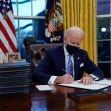January 20, 2021, was a busy day for White House ethics. In the morning then-president Trump revoked his 2017 ethics policy and, in the afternoon, as one of the seventeen executive orders he signed on his first day, President Biden introduced his own Executive Order on Ethics Commitments by Executive Branch Personnel.
Trump’s revocation of his Executive Order on Ethics Commitments by Executive Branch Appointees released those who had signed it from their obligation not to engage in lobbying activities with respect to the agency in which they had been employed for five years after leaving office. That five-year ban lay at the heart of the Trump ethics pledge, which placed few other restrictions on lobbying activities by his appointees.
Perhaps with that in mind, the Biden document begins with a lengthy preamble with no equivalent in the Trump pledge. It calls for a set of sweeping “commitments” to be made by those signing the pledge that goes well beyond the question of lobbying, some of them decidedly pointed in light of the previous administration’s policies. It is worth quoting in full:
I recognize that this pledge is part of a broader ethics in government plan designed to restore and maintain public trust in government, and I commit myself to conduct consistent with that plan. I commit to decision-making on the merits and exclusively in the public interest, without regard to private gain or personal benefit. I commit to conduct that upholds the independence of law enforcement and precludes improper interference with investigative or prosecutorial decisions of the Department of Justice. I commit to ethical choices of post-Government employment that do not raise the appearance that I have used my Government service for private gain, including by using confidential information acquired and relationships established for the benefit of future clients.
Preamble aside, there are similarities between the Trump and Biden orders: both prohibit executive appointees (“personnel” in the language of the Biden order) from accepting gifts from lobbyists, and both contain an identical “employment qualification commitment” that specifies that all signatories “agree that any hiring or other employment decisions I make will be based on the candidate’s qualifications, competence, and experience.”
The Biden version, on the other hand, discards the blunt five-year prohibition on lobbying in the Trump pledge and replaces it with a detailed number of “revolving door” clauses that more explicitly cover a wider variety of scenarios than mentioned in the Trump document. The Biden pledge hearkens back to the Obama-era ethics pledge and, in at least two areas, goes beyond that of its predecessor-but-one.
According to the new revolving-door ban, anyone who was engaged as a lobbyist for the two years prior to government appointment cannot directly “participate in any particular matter involving specific parties that is directly and substantially related to my former employer or former clients, including regulations and contracts.” Mirroring that is a requirement prohibiting communication with senior White House staff on similar topics for two years following the end of an appointment.
The ban is further strengthened by a new wrinkle: an overall ban on engaging in lobbying activities after leaving office that remains in force “for the remainder of the Administration or 2 years following the end of my appointment, whichever is later.” That extends the term prescribed in the Obama-era pledge in order to minimize the ability of executive branch personnel to trade upon the contacts they made while working in government.
The real novelties in the Biden pledge are yet to come, however. The first is an attempt at eliminating so-called “shadow lobbying” that applies to “senior and very senior appointees leaving government”:
for a period of 1 year following the end of my appointment, I will not materially assist others in making communications or appearances that I am prohibited from undertaking myself by (a) holding myself out as being available to engage in lobbying activities in support of any such communications or appearances; or (b) engaging in any such lobbying activities.
This so-called “shadow lobbying” occurs when a senior member of government, without registering as a lobbyist, nonetheless facilitates connections between government officials and other lobbyists. It’s not lobbying per se, but it is taking advantage of a position one held in the government. The Biden ethics pledge seeks to close that loophole.
Also new is a “golden parachute ban”:
I have not accepted and will not accept, including after entering Government, any salary or other cash payment from my former employer the eligibility for and payment of which is limited to individuals accepting a position in the United States Government.
There was no mention of such a ban in either the Trump or Obama pledges.
Progressive lawmakers urged a stronger lobbying ethics pledge upon Biden prior to his taking office, seeking something like the Obama-era restrictions. They received something even more comprehensive, which ought to suit their fancy. That said, a number of former lobbyists have made their way into the administration, and some left-leaning organizations have called for more detailed financial disclosures from some of those appointees.
Of course, the real question isn’t the pledge itself, which sounds lofty and wholly admirable, but in its enforcement (and, indeed, its enforceability.) But then a great deal remains to be seen as to what is to become of the raft of executive orders signed by the new president.






